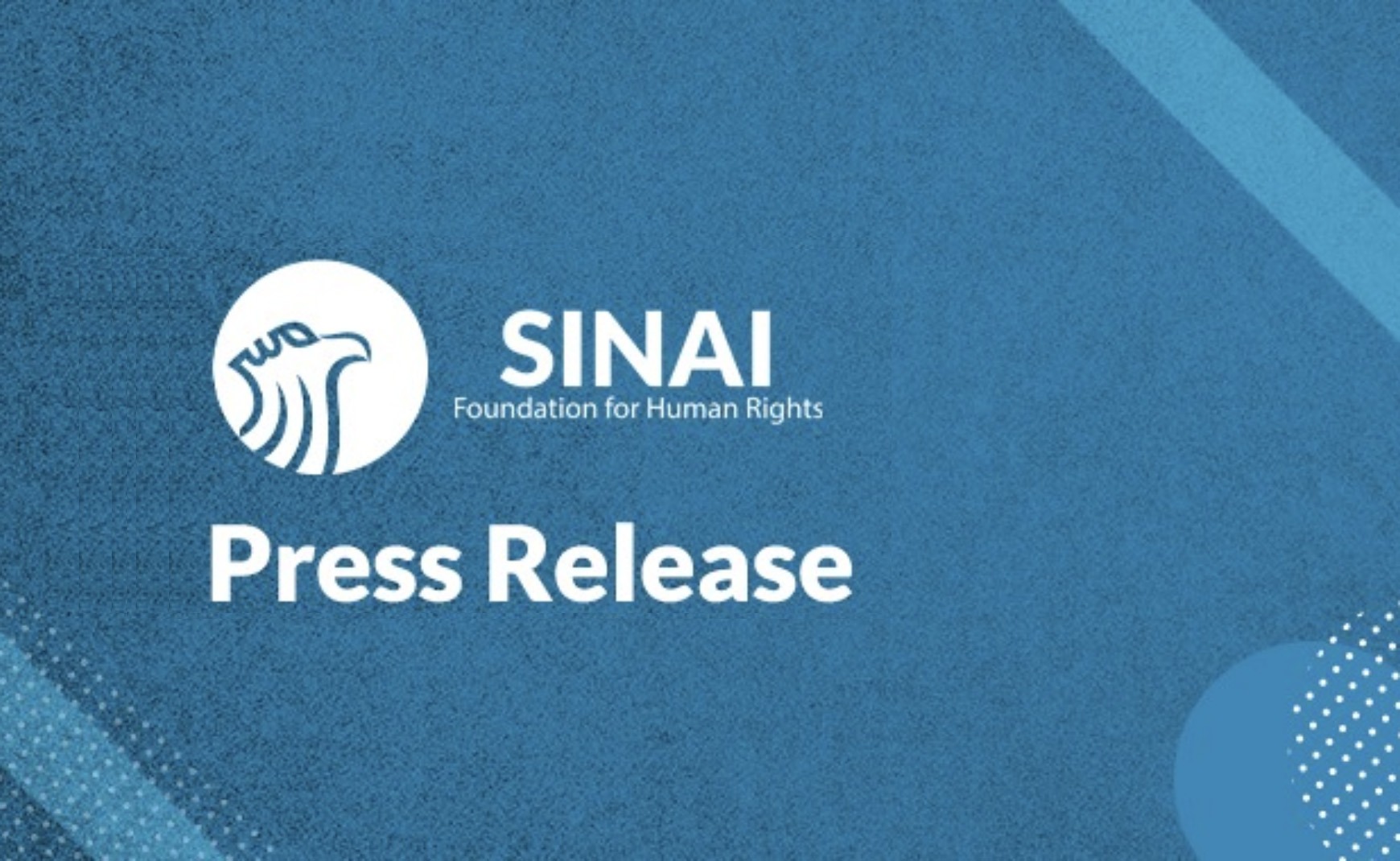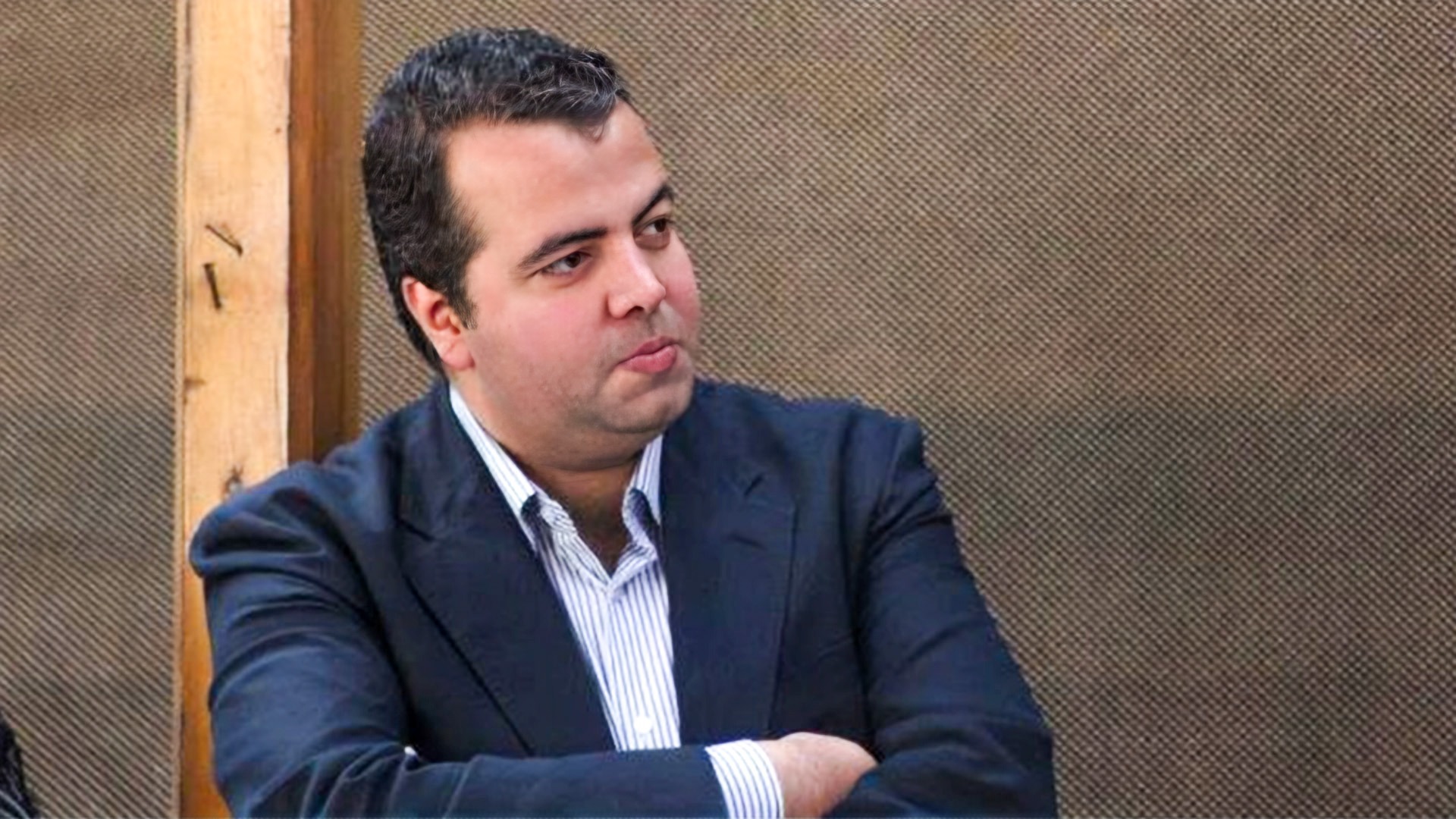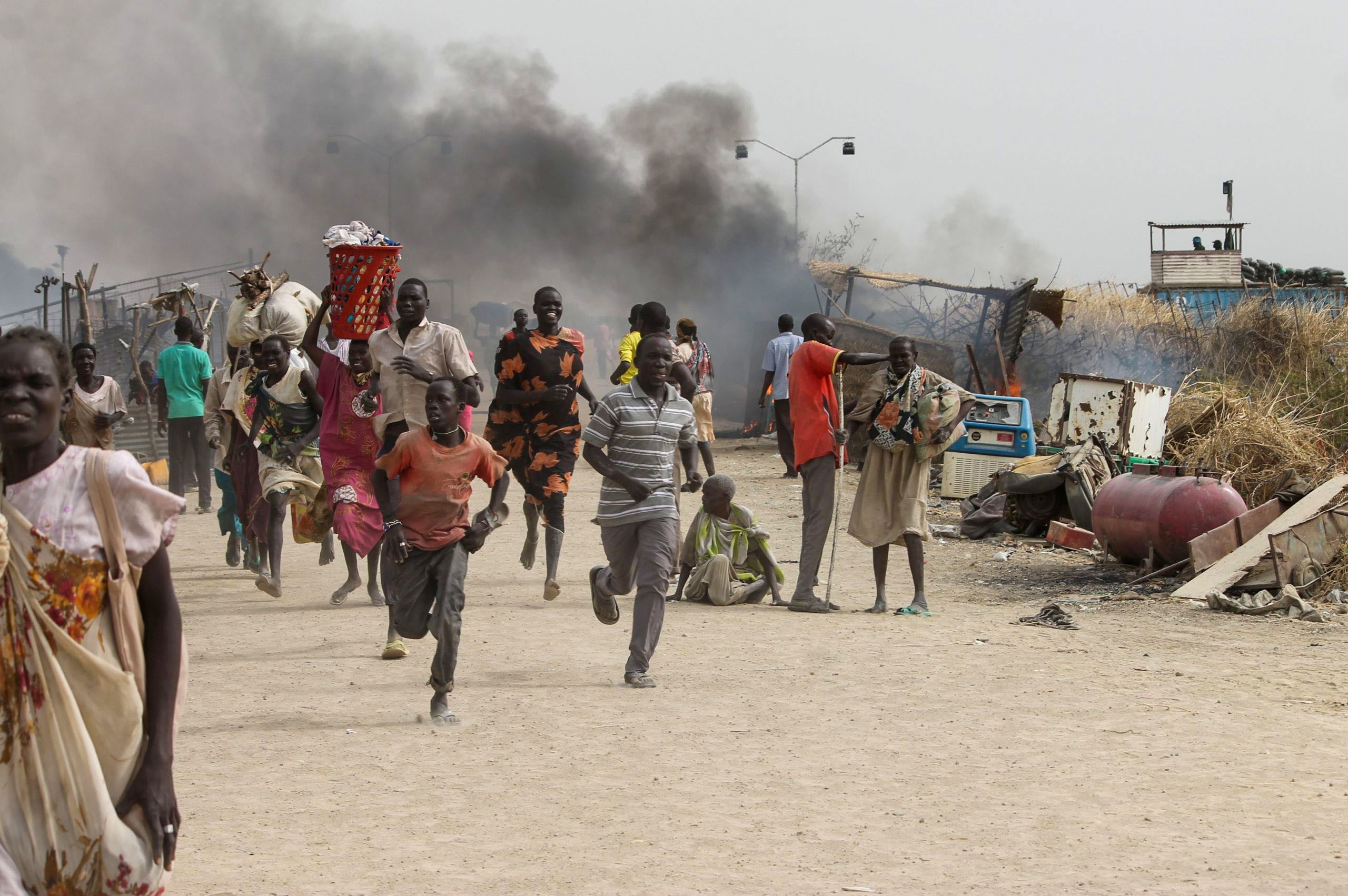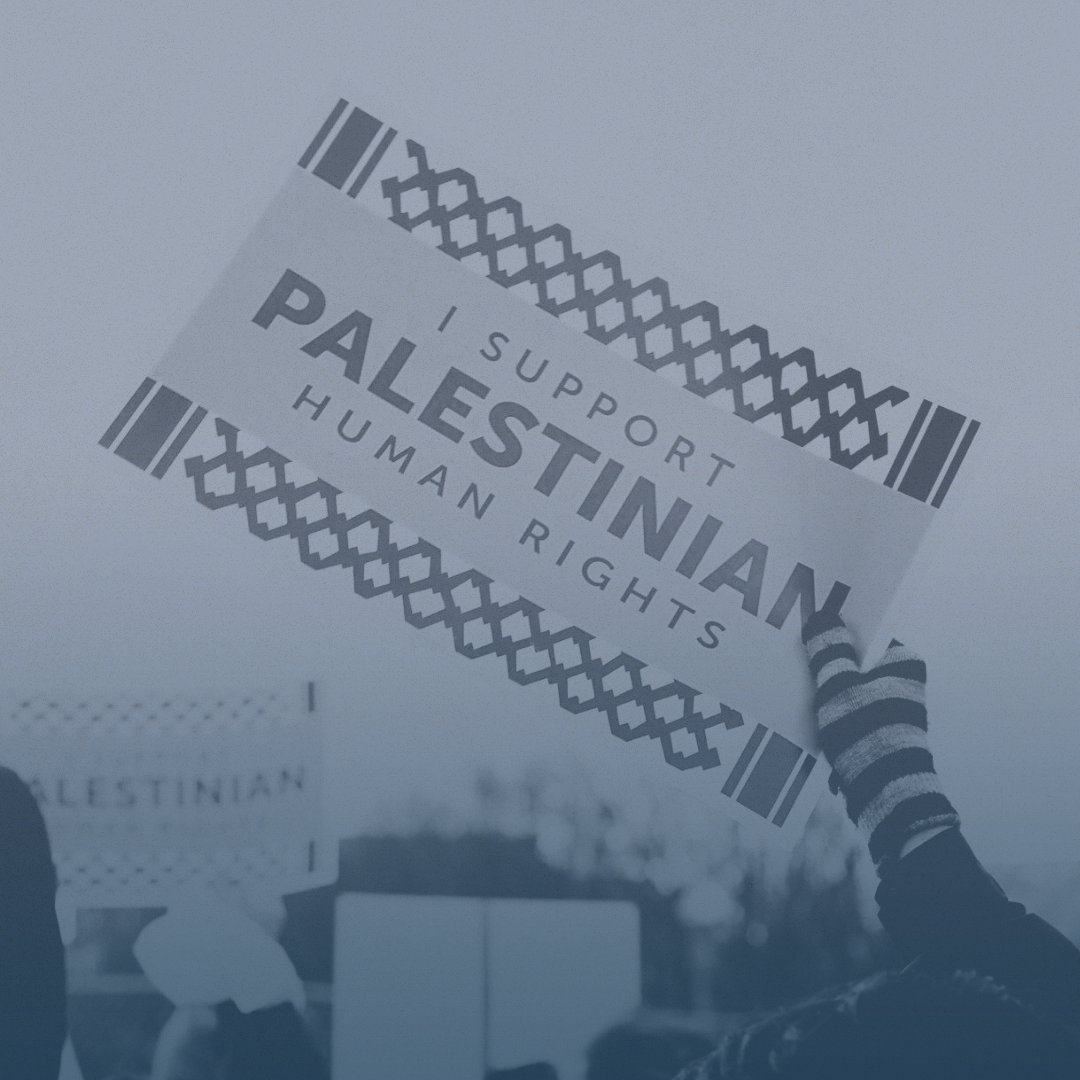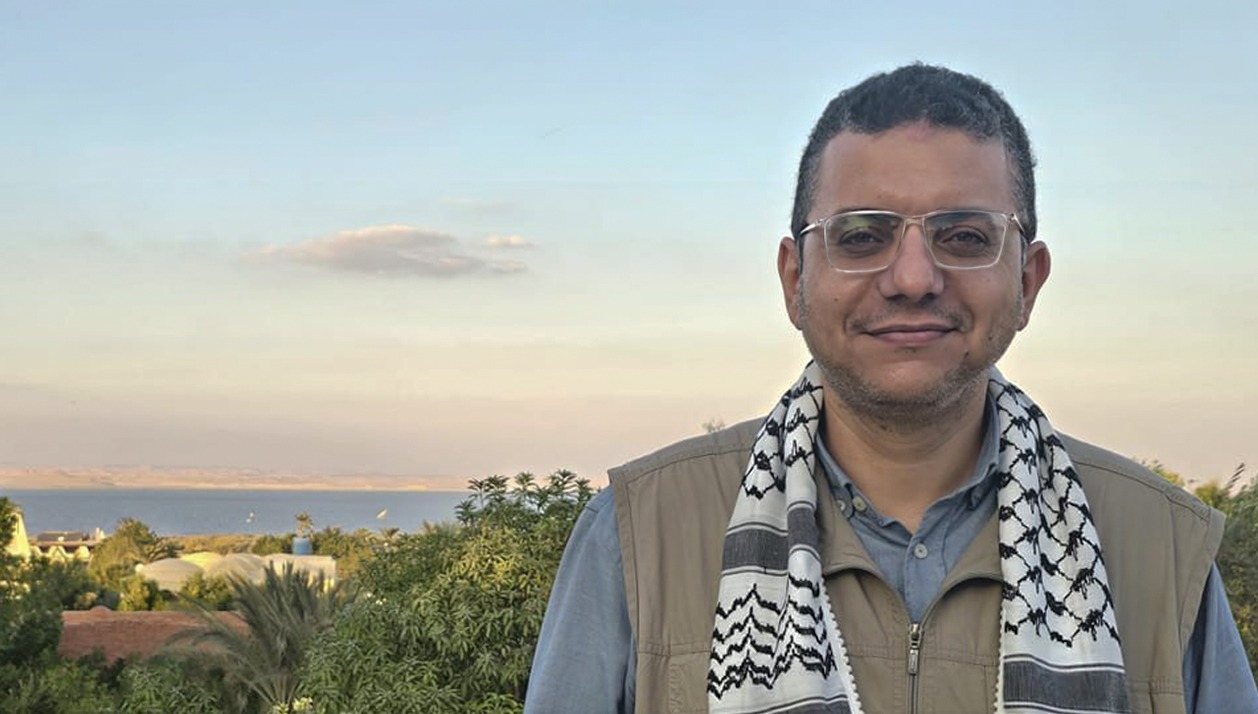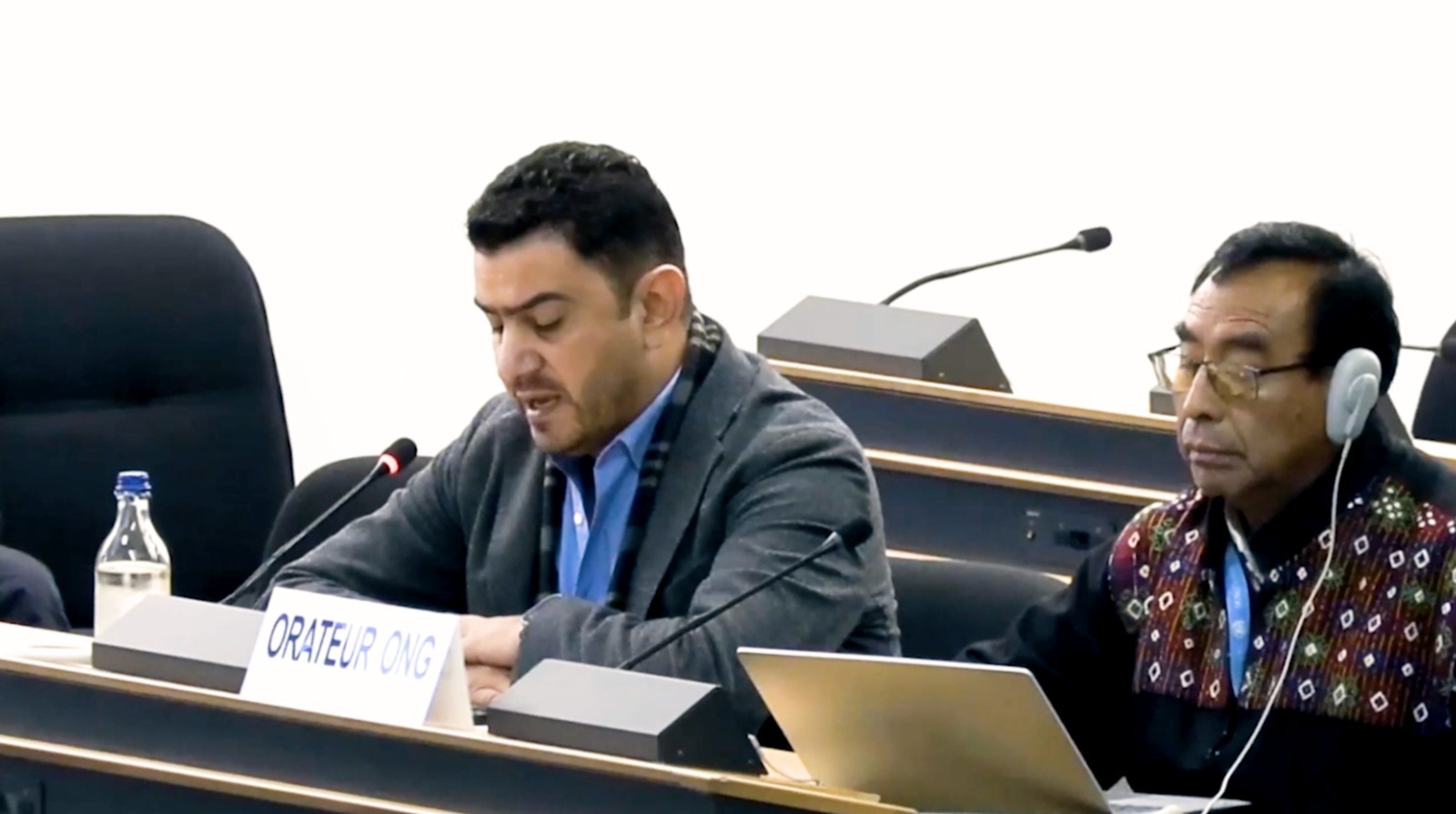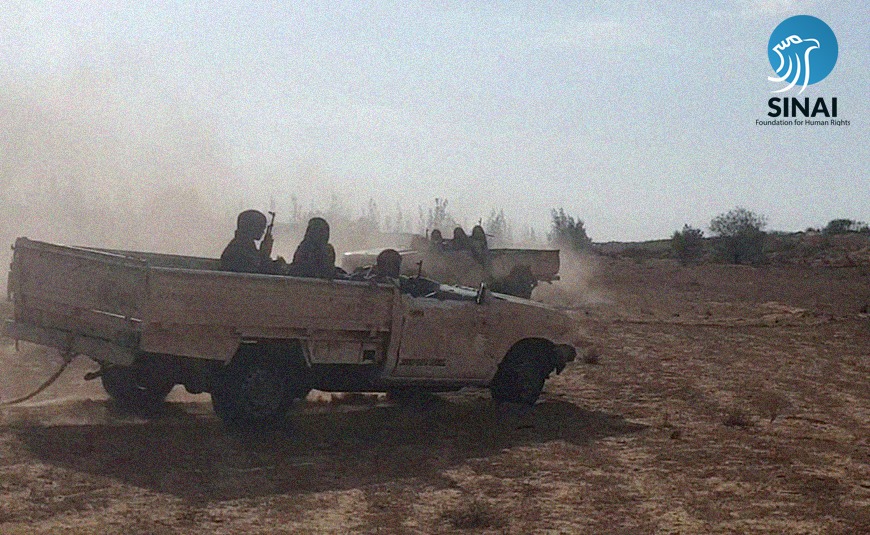
The most notable abuses that took place during September 2021
Summary:
September 2021 witnessed several abuses, including the appearance of civilians who had been forcibly disappeared for various periods of time before court in trials that lack standards of justice.
On the other hand, the Sinai Foundation followed up on the abduction of a group of 10 civilians in Balouza village by ISIS, as well as the injury of 3 civilians by gunshots fired by the terrorist group during the abduction.
Details of the abuses
Egyptian law enforcement forces abuses:
Forcibly disappeared individuals appearing in court as defendants
The Sinai Foundation for Human Rights followed trials that lack the standards of fair trial of five civilians who had been forcibly disappeared for various time periods by security forces. Some of those individuals were detained by security authorities and forcibly disappeared after the authorities received official orders to release them after the maximum legal period of preventative detention of two years was exceeded.
The first incident was monitored by the foundation’s legal team on 8 September 2021, where “Rabab Jumaa Mohamed Ouda”, 26, appeared after 3 months of enforced disappearance when she was brought before the Supreme State Security Prosecution with an arrest warrant written on 5 September 2021, while the actual date of her arrest was 3 June 2021, ignoring the period of enforced disappearance in official documents. It is worth mentioning that Mrs. Rabab is a mother of three, and she is accused in case number 1935 for the year 2021 and the crimes she is accused of are knowingly joining a terrorist group and supporting and funding terrorist groups.
The second incident took place on 13 September 2021, where our legal team documented the criminal court held in the consultation room of the Institute of Police Secretaries’ renewal of detention hearing of several defendants in case number 750 for the year 2019 under the authority of the State Supreme Security Court. Among the defendants are:
1/ Nisma Jumaa Salim Salama 2/ Aida Esleem Jumaa Suliman
It is worth mentioning that both defendants Nisma and Aida’s maximum legal period of preventative detention of two years was exceeded and no action was taken with either of them since the beginning of the investigations. Both defendants had been arrested on the al-Qantara ferry in September 2019 while travelling to North Sinai, and they were forcibly disappeared for 3 months before they were brought before the prosecution for the first time on 8 July 2019.
On 26 September 2021, the State Supreme Security Court ordered their release for surpassing the legal period of preventative detention, but they were not released or transported from Tura prison to the police station where their places of residence are registered to finish their release procedures, and the Ministry of Interior refrained from executing the prosecution’s decision.
It is worth mentioning that both defendants had been married at a very early age and have young children they were separated from by their detention. Also, both defendants denied in the investigations any connection with ISIS, and case files contain no tangible evidence except a limited amount of food supplies found with them when they were arrested.
The third incident was monitored by the foundation on 14 September 2021, where the defendant Omar Swilam Selman Saleem, 21, appeared before the State Security Court after 60 days of enforced disappearance. He was accused in case number 1935 for the year 2021 under the authority of the State Supreme Security. He was charged with knowingly joining a terrorist group, and supporting and funding terrorist groups. It is worth mentioning that he had been arrested on 21 December 2020 after a fight, and a conciliation report was written and the release of both parties was ordered. However, Omar was not released and was instead forcibly disappeared by National Security for 6 months before being brought before the prosecution on 19 June 2021, charged with joining a terrorist group. As a result of insufficient evidence, the prosecution ordered his release with precautionary measures on the same day, and the decision was executed.
Later on 14 July 2021, an order of his release and the cancellation of the precautionary measures was issued, and when he went to the Ras Sedr police station to finish the procedures, he was detained and forcibly disappeared for the second time for a month before appearing before the State Supreme Security Court on 13 September 2021 accused in case number 1935 for the year 2021 under the authority of the State Supreme Security.
The fourth incident was documented by the Sinai Foundation for Human Rights’ legal team on 14 September 2021, where “Mohamed Muhsin Zaki” appeared after two months of enforced disappearance after finishing a five-year sentence in another case, but the State Security force did not release him despite finishing his sentence, instead “recycled” him and charged him in another case.
The detainee Mohamed Muhsin Zaki is 29 years old, a citizen of Ras Sedr in South Sinai. He was arrested at his home on 13 April 2016 by the State Security force and was forcibly disappeared for 80 days until he was brought before the prosecution on 3 July 2016 to be investigated in connection with case number 452 for the year 2016 under the authority of the State Supreme Security and was charged with joining a terrorist group. The case files were then transferred to the military court where he ended up being sentenced to 5 years in prison in June 2019.
On 3 July 2021, he finished his 5-year sentence and was transferred to Ras Serd police station for pre-release procedures. But he was surprised when he was detained by National Security who refused to release him. He then appeared on 14 September 2021 before the State Supreme Security Court for investigation in relation to case number 1935 for the year 2021 under the authority of the State Supreme Security where he was faced with the same changes based on which he had previously been imprisoned for five years.
The foundation’s legal team documented legal abuses and violations, which are:
First: Continuing to detain individuals after their release was ordered and charging them in new cases.
Second: Bringing detainees before the prosecution after surpassing the legal period.
These abuses mount up to flagrant violations of the Egyptian constitution, including article (51) which states: “Dignity is a right for every person that may not be infringed upon. The state shall
respect, guarantee and protect it”, as well as article (54) which states: “Personal freedom is a natural right which is safeguarded and cannot be infringed upon. Except in cases of in flagrante delicto, citizens may only be apprehended, searched, arrested, or have their freedoms restricted by a causal judicial warrant necessitated by an investigation. All those whose freedoms have been restricted shall be immediately informed of the causes therefore, notified of their rights in writing, be allowed to immediately contact their family and lawyer, and be brought before the investigating authority within twenty-four hours of their freedoms having been restricted. Questioning of the person may only begin once his lawyer is present. If he has no lawyer, a lawyer will be appointed for him. Those with disabilities shall be provided all necessary aid, according to procedures stipulated in the law.
Those who have their freedom restricted and others possess the right of recourse before the judiciary. Judgment must be rendered within a week from such recourse, otherwise the petitioner shall be immediately released. The law shall regulate preventive detention, its duration, causes, and which cases are eligible for compensation that the state shall discharge for preventative detention or for execution of a penalty that had been executed by virtue of a judgment that is overruled by a final judgment. In all cases, the accused may be brought to criminal trial for crimes that he may be detained for only in the presence of an authorized or appointed lawyer”
The foundation’s legal team also mentions that the detention of apprehended individuals for long periods without bringing them before the public prosecutor is in itself great psychological pressure and terror for the detainee, especially in the detention centers at which they are kept which are subsidiary to the Ministry of Interior and are not supervised by the Ministry of Justice, which brings doubt about the bare minimum of human rights standards available in those places. This goes against article (55) of the constitution, which states: “All those who are apprehended, detained or have their freedom restricted shall be treated in a way that preserves their dignity. They may not be tortured, terrorized, or coerced.
They may not be physically or mentally harmed, or arrested and confined in designated locations that are appropriate according to humanitarian and health standards. The state shall provide means of access for those with disabilities. Any violation of the above is a crime and the perpetrator shall be punished under the law. The accused possesses the right to remain silent. Any statement that is proven to have been given by the detainee under pressure of any of that which is stated above, or the threat of such, shall be considered null and void.”
It is obvious that security authorities circumvent article 143/3 of the Code of Criminal Procedure, which states: “In all cases, the period of temporary pretrial detention and all trail proceedings shall not exceed third the maximum period of the custodial sentence, where it shall not exceed six months for misdemeanors, eighteen months for felonies, and two years if the established penalty is the life sentence or execution” by continuing to detain arrested individuals after their release was ordered for exceeding the legal limit for pretrial detention then bringing them again before the State Supreme Security Court under different invistigations in different cases, so the two-year maximum period of pretrial detention begins again. These are considered unlawful absolute detention orders.
ISIS-affiliate group, Sinai Province, abuses
The abduction of civilians
The Sinai Foundation for Human Rights documented a case of group abduction that took place at around 8 PM on 31 August 2021, where the ISIS-affiliate, Sinai Province group attacked a coffee shop in Balouza village in western Bir al-Abd, North Sinai, 120 Kilometers west of al-Arish. The group surrounded the coffee shop with three vehicles of which about 15 militants armed with hidden weapons stepped out.
According to eyewitnesses interviewed by the foundation team, the attack lasted close to 20 minutes, where an armed group stormed the coffee shop while the remaining militants spread out around the place from the back to secure the area. At first, the assailants tried to terrorize people by firing their guns heavily, causing a state of chaos some young civilians tried to use as a distraction to escape for fear of being captured by the group before the militants shot at them and injured three of them. The group then abducted 10 civilians from the ones who were at the coffee shop and forced them into their vehicles and drove off with them to an unknown location. The militants also seized two civilian vehicles during the attack.
The Sinai Foundation for Human Rights acquired the information of the three injured civilians who were transferred to Bir al-Abd general hospital for medical aid from a medical source. The victims are:
1- Ali Mosoud Ali, 33 gunshot to the knee
2- Mohamed Nasrallah Suliman, 27 gunshot to the pelvis
3- Jabir Hassan Mohamed al-Ghafir, 26 gunshots to the knee and lower back
The foundation team also obtained the names of the abducted civilians, and they are:
1- Mohamed Nabil al-Said, 35 6- Omar Mohamed Salim, 18
2- Nasr Alawy Rashid al-Gindy, 49 7- Mohamed Salim Abdellatif, 17
3- Redallah Hussein Redallah, 47 8- Basil Mohamed Abdullah, 27
4- Hany Nasr ali Rashid, 35 9- Hussam Hassan Redallah, 23
5- Salim Ahmed al-Said al-Aqraa, 27 10- Ibrahim Suliman Mheisin, 40
According to an eyewitness, there were (manadeeb/delegates), civilians working with the military, at the coffee shop which was attacked at the time of the attack, however they managed to escape at the time of arrival of the militants’ vehicles. It is thought that the reason behind the attack was ISIS militants’ desire to capture the group of delegates who work with the military for attacking two ISIS members a few weeks before that incident, delivering one of them to the military and injuring the other before he managed to escape.
The foundation later documented on 5 September 2021 ISIS’s release of 9 of the abducted civilians, and once they reached Hemeisa village, military forces transported them to a checkpoint in Rabea village to be interrogated by military intelligence. When citizens gathered in front of the camp demanding the release of their children, military officers asked them to go home and promised to release their relatives and drive them home as soon as their investigations were done, which did happen.
It is worth mentioning that Mohamed Nabil is the only civilian remaining in the armed group’s custody from the civilian group abducted in Balouza. He has not been released until the time of writing the report. The group sent Ahmed’s family a message with one of the released civilians claiming that Mohamed was injured and receiving treatment and that he would be released once his health condition improved.
The foundation team met with “Khaled”, a fake name given to an eyewitness to the incident. He said:
“The young men were at the coffee shop. These men had nothing to do with the military or ISIS, and had nothing to do with what had happened a few weeks before when a military-affiliated group attacked two terrorists. The people of Sinai stopped interfering because when we inform the military of suspicious people, they don’t do anything about it. And if the terrorists knew someone reported them, they would slaughter that person. So, people choose safety, and if they see a suspicious person, they let them leave then inform the military. The group who captured the two militants a while back are people who work with the military and get paid. We call them delegates, but the inhabitants are poor people who just want to live peacefully and raise their children.”
He added: “What happened that day was, we suddenly saw three vehicles coming our way. People who thought they were military and got scared ran away, and the people who work with the military also ran away because they thought they were terrorists. The rest stayed where they were because they are not involved with either group and were not scared. When the militants came into the cafe, they ordered everyone inside to come out with them. Some people stood up and refused, but when the militants fired at them, everyone else got scared and got into the militants’ vehicles. After they left, we called an ambulance, which arrived around 20 minutes after the militants had left.”
They witness continued: “There were around 15 armed militants. They had three vehicles, one of which had a large back. They indiscriminately took the young men who were there, and shot at the ones who tried to run away. “Mohamed Nasrallah” was shot, and his condition was critical because he was shot in the pelvis. “Ali Masoud” and “Jabir Hassan” were also injured, both in their knees. The situation of the abducted citizens is terribly sad. People are dying of fear for their children; they don’t know if they would return, and the military isn’t doing anything about it.”
After the Sinai Province group released 9 of the abducted civilians, the foundation met with two of them to learn the details of their suffering during their days in the hands of the group. The foundation publishes in this report a specific part of the released abductees’ testimonies based on their request and to preserve their safety.
“Saleem” Fake name
He told the foundation: “I was afraid and didn’t really believe what was happening. It all felt like a dream, but sadly it was the reality we were living; we were held captive by ISIS. The second day when we woke up, we started recognizing each other by voice. We were in sheds next to each other, and if one of us spoke, we would recognize his voice. The first one I recognized through his voice was “Hany” because he was screaming from pain and wasn’t doing well. I then learned “Nasr”, “Redallah”, and the rest were also there.”
He added: "The first day after we were taken, they brought us food which was rice and bread placed in a cut-up tin. We all refused to eat because we’re not used to eating like this and asked for something to drink. They threatened us that if we did not eat, they would not give us something to drink. So, each of us ate just a little bit and said we couldn’t eat more. They fed us once a day and the water was very limited. When I asked to use the bathroom, the guard took me while blindfolded and we walked for a while on sand then the guard told me to go out in the open. It’s a hard and humiliating feeling, but there were no alternatives because their rules were that the bathroom was allowed once a day and no bathroom after sunset. The thing we feared most was the aircraft. We could hear airstrikes close by and we were terrified at every moment that they would be bombed by an aircraft and that we too would be killed with them.
Saleem said: "On the next day, they started interrogating us. They took us to a different shed from the one where we were staying, one at a time, and the person interrogating us was a different person from the ones we dealt with during the entire period we were taken. They asked about who from us worked with the military, who from the people of the village worked with the military, and he asked about certain people from the village by name. They made us turn on our phones and they searched them. They looked for photos of us with military personnel or numbers of officers. The one who was interrogated would be brought back to the shed. They moved us from one place to another once or twice a day. When one of us had pain in his eyes due to the blindfold, they took him some distance from the rest and took the blindfold off while he held his head between his legs for a minute or two, then tied him up again and brought him back to the shed. After the interrogations on the third day, they took the shackles off our hands and feet and told us not to try to escape or we’d die. None of us was planning on escaping in the first place; we were terrified.
He added: “On our last day there, they did not tell us they were releasing us. They took us after Dhuhr prayer, divided us into groups of two, and made us walk a long distance. They asked us to hide in the middle of some sandburs they had prepared (sandbur is the name of a desert plant) because there was a lot of aircraft that day. Around two hours later, they put us in a car where we were all together in one place for the first time, but without Salim al-Aqraa, Omar Mohamed, and Mohamed Nabil, we did not know where they were and when we asked, they did not answer.”
He continued: “The militants told us then that we were going home. They stopped the car at a mountain (desert) area and asked us to get out, then gave us our belongings they took on the first night, except our phones. They gave those of us who had had phones money for them, except Hany who had an old phone, so they gave it back to him. They then told us to walk in that direction and at night we would find streetlights and that is Hemeisa village, and that there is a military camp before the village and not to go into the village that way because the ambush would shoot us if we got close.”
Saleem added: “Before we started toward Hemeisa, a scorpion stung “Basil Mohamed” in the leg and he screamed and fell on the ground. We tied his leg with a scarf, then “Hany” carried for a while so we could leave that place quickly. When Hany got tired, we started carrying and supporting Basil one by one. All we cared about was getting out of there as fast as possible. We walked till 01:30 in the morning. When we came close to Hemeisa, the military camp was in front of us and we argued which way to take and our voices got loud, so the camp started heavily shooting at us and other camps started shooting too and we could hear them very close to us. We were so scared that we crawled for a long distance for fear of standing up and being shot, then we hid in an abandoned house.”
He continued: “There was an engineer with us who worked at the pipe company. He had been taken before us and was let go when we were. He told Hany to call the emergency service. We wondered how anyone could pick up because there was no signal. But when Hany tried calling, the emergency service in Cairo picked up. We told them we had been abducted by ISIS, and they told us they would transfer the call to al-Arish. Al-Arish then transferred us to the military ambush in Rabea, and when the officer at the camp recognized us and checked our names, he told us they would shoot from the camps and we need to tell them if the gunfire was close by or far away to pinpoint our location, and the gunfire did move from afar till it was very close to us, so the officer told us that they knew our exact location and to wait till morning and not approach the camp till then.”
He added: “Once it was morning, we heard soldiers at Hemeisa camp calling us, so we started fearfully approaching them till we reached the camp, and they took us inside and called an ambulance for Basil Mohamed who had been stung by a scorpion. They brought us breakfast then transferred us to Rabea camp where the officer told us that they were following up on us every second and that President al-Sisi was paying attention to every detail, and that aircraft were closing in on the takfiris and that is why they let us go. They then asked us about the details of what happened and the officer asked us to record videos and said they would not be shown to the media but will be sent to the presidency. They recorded us one by one, asked us to say our names and personal information, and thank the military which freed us. Then we were taken in a big armored vehicle and taken home to our families, thank god.”
"Faisal” Fake name
He told us: “The militants tied our hands behind our backs and blindfolded us at gunpoint. They then put us in vehicles they had, dividing us in more than one car. I think they took us south on the al-Shuhat village road, and I could recognize that because of the speedbumps on the road. At that time, there were two other abductees with me in the car, and we thought we were the only ones taken. The next day, we were surprised that there were others, which we knew by their voices because we were blindfolded.”
He added: “We got out of the car and into another one. We drove for about one hour till we reached an area in the desert because when we got out of the car, we walked on sand till we were brought into sheds. They told us to sleep where we were, then they woke us up for Fajr prayer. We prayed with them while blindfolded, they had warned us against trying to remove the blindfolds. In the morning we were transferred to another location and had our hands and feet shackled.”
Faisal said: “All the time I spent there I was thinking of my fate and felt like I would never get out of that place alive. The photos and videos we saw of militants slaughtering and killing people they had abducted were always playing in my mind.”
The abduction of civilians is a recurring pattern of abuse in Sinai. ISIS group is used to abducting civilians and keeping them for long periods of time as part of a strategy it follows with the aim of asserting its dominance and punishing anyone it deems as supporters of the Egyptian authorities.


